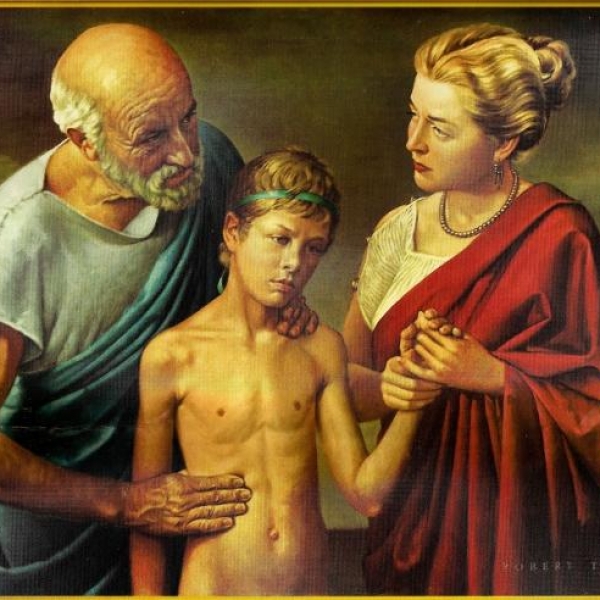
Dr. Pham Thi Le Na at MD Anderson Cancer Center, Houston, Texas. Photo: Doctor provided
Medicine is the longest and most expensive discipline in America. The average time to become a doctor is 12 years, of which it takes 3-8 years to work as a resident and specialist. For foreigners, in order to practice in this country, they must score high on the USMLE national exam and receive the "Diploma of the equivalent of an American doctor" by the ECFMG (Medical Graduation Committee for Foreigners. faculty) level. However, with love of Medicine, in February 2018, Na decided to leave. Luggage only has a university degree and some money saved while in Vietnam.
Coming to the US, Na immediately began to practice for the USMLE national exam, consisting of two theoretical rounds and one clinical round.
The first round is considered to be the most difficult stage, lasting 8 hours, about 350 multiple-choice questions to assess medical science knowledge of doctors. Na spent 14 months indoors, reading documents, researching all her knowledge of physiology, anatomy, and basic biochemistry. While studying, she did a clinical internship at MD Anderson's leading cancer hospital. This internship helps her solve her professional questions while equipping her with the palliative care skills a cancer doctor needs.
"Sometimes a whole bunch of professors, oncologists, and psychiatrists go to clinics just to solve a patient's problem with going to the toilet," recalls Na.
The second round of testing took place 9 hours, about 370 multiple-choice questions assessing knowledge of clinical pathology. Also in this round, the test taker must undergo a sub-exam that assesses clinical skills such as the ability to get information from the patient, examine the doctor, record and communicate the results to the patient. And the final two-day exam assesses the entire patient's knowledge and ability to treat the patient without the supervision of a doctor.
To pass USMLE, a candidate must score very high (about 95-99 percent) on the first attempt.
"In Vietnam, it is often said 'as difficult as the boarding exam' and the US boarding exam is compared to 'as difficult as picking stars in the sky'," Na clicked her tongue.
Clinical attendance is an important criterion to become a resident doctor, but in the US, it is mainly to accompany the main doctor to observe and exchange opinions, not to consult directly with the patient. Due to the Covid-19 influence, finding a place to practice is more difficult. Na knocked on the doorstep, asked the doctor who used to work, read more documents, watched many videos to find her opportunities.
Passing the three exams, Na continued to compete in the interview round. "There are times when among 5,000 profiles, only 100 people choose and all of them are very beautiful," Na said. Not to mention, the US also prioritizes the selection of young people who graduate under 5 years for training. Le Na graduated for 10 years. Her profile also has no medical research or clinical experience, and her college transcript ranks just as well. But she still defies the submission, believing that the recruiter will find her interesting point.
"If I am not professional, I can study and I am old, how can I change," Na laughed. She also encouraged herself that if she did not pass, she could still bring that knowledge back, supplementing her expertise along with foreign language skills that had been forged abroad.

Doctor Le Na wears protective gear to the airport to go to New York to practice. Photo: Doctor provided
Becoming an American resident doctor is the dream of many young people. Na too, but her goal is not to become an American doctor but to be a scientific researcher. Her specialty is surgery in cancer treatment. "At that time, whether I was in the US or anywhere, I could still help Vietnamese patients correctly diagnose and treat the disease properly," Na said.
On the day of her admission, apart from her own joy, Na knew that some doctors had killed themselves because they did not pass the exam. Calm yourself, she thought, not passing the exam is just not charming enough, it cannot be denied anyone's talent. "However, because it takes all the money and time to invest in the boarding exam, this is still a shock that is difficult to overcome for many people".
Looking back at the 6 years of medical study in Vietnam plus 10 years of experience and the upcoming 4 years of boarding, a total of nearly 20 years of youth to study medicine, Na always encourages herself, taking busyness as fun. For her, oncology has many unknowns, she must continue to learn to explore and find the right diagnosis, correct treatment, and pain relief for patients.
During this time, she learned more materials to prepare for admission in July at East Tennessee State University, to become a good medical surgeon. In addition, she also went to youtube to teach specialized English, and shared tips on finding the clinical environment for Vietnamese doctors. Na also plans to go with her husband to make up for a honeymoon. The two just got married earlier this year, but due to Covid-19 and a tight schedule, there is no time to spend together.
Fold her computer, clocking in at 2am, Na sighs as she completes the video "Medical terms of hematology and cancer". The videos are posted on the personal page, helping Na connect with many Vietnamese doctors. All ideas, content, filmed and edited are made by Na, based on her own experience.
"The image is not very good, but I will try to improve. I hope the knowledge I have will bridge and inspire many young Vietnamese people," Na said.
Thùy An.
Source: https://vnexpress.net/con-duong-tro-thanh-bac-si-noi-tru-my-cua-co-gai-viet-4252137.html


















